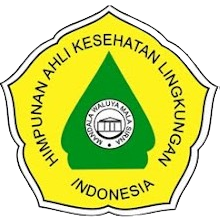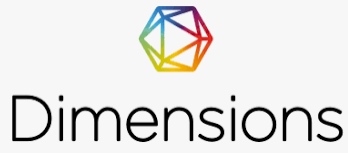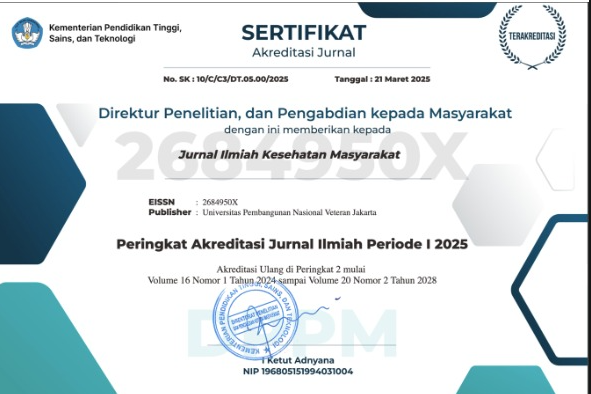Pemanfaatan Media Sosial Terhadap Stigma Masyarakat Mengenai Penyintas Covid-19
Abstract
Abstrak
Latar Belakang: Covid-19 resmi dinyatakan sebagai pandemi oleh WHO pada 11 Maret 2020. Penularan virus yang sangat cepat serta belum ditemukan obat yang sepenuhnya dapat mengatasi penyakit ini membuat masyarakat semakin ketakutan. Kasus positif Covid-19 yang masih ada sampai saat ini berkontribusi mendorong munculnya ketakutan. Tak sedikit stigma diberikan oleh masyarakat khususnya bagi para penyintas Covid-19. Berdasarkan survei lapor Covid-19 tahun 2020, sebanyak 55,3% responden mendapatkan stigma dari orang sekitarnya, 42% didapatkan oleh keluarga dan kerabat, serta 33,2% responden terkucilkan. Perkembangan teknologi yang semakin pesat membuka jalan bagi penggunaan media sosial. Media sosial sebagai salah satu cara penyebaran informasi memiliki andil dalam munculnya stigma yang ada terkait Covid-19, khususnya bagi para penyintas Covid-19. Penelitian ini bertujuan untuk memberikan gambaran mengenai peran media sosial dalam bidang kesehatan untuk meningkatkan pengetahuan masyarakat terkait Covid-19 serta mengurangi misinformasi yang dapat memunculkan stigma bagi para penyintas Covid-19.
Metode: Literature review dengan penelusuran artikel bersumber dari database publikasi ilmiah, seperti Google Scholar, PubMed, dan Crossref.
Hasil: Berdasarkan 9 literature menunjukkan terdapat stigma masyarakat mengenai penyintas Covid-19, seperti diskriminasi, stereotip, dan pelabelan. Berdasarkan hasil, media sosial berperan dalam mengurangi kesalahan informasi terkait Covid-19 yang mengarah kepada munculnya berbagai stigma.
Kesimpulan: Perkembangan media sosial dapat dijadikan peluang dalam mengembangkan dan memanfaatkan komunikasi yang efektif bagi tersedianya informasi kesehatan yang valid dan terpercaya. Tidak hanya para profesional kesehatan, masyarakat maupun orang terdekat dari penyintas Covid-19 juga berperan penting dalam menghindari munculnya stigma negatif.
Kata Kunci: Covid-19, Media sosial, Penyintas covid-19, Stigma
Abstract
Background: Covid-19 was officially declared a pandemic by the WHO on March 11, 2020. The very fast transmission of the virus and no drugs that could fully overcome this disease have made people even more afraid. The positive cases of Covid-19 that still exist today have contributed to the emergence of fear. There is a lot of stigmas given by the community, especially for Covid-19 survivors. Based on the 2020 Covid-19 reporting survey, 55.3% of respondents received stigma from the people around them, 42% were obtained by family and relatives, and 33.2% of respondents were isolated. Rapid technological developments pave the way for the use of social media. Social media as a way of disseminating information has contributed to the emergence of the existing stigma related to Covid-19, especially for Covid-19 survivors. This study aims to provide an overview of the role of social media in the health sector to increase public knowledge regarding Covid-19 and reduce misinformation that can create stigma for Covid-19 survivors.
Methods: Literature review by searching articles sourced from scientific publication databases, such as Google Scholar, PubMed, and Crossref.
Result: Based on 9 literature, it shows that there is a public stigma regarding Covid-19 survivors, such as discrimination, stereotypes, and labeling. Based on the results, social media plays a role in reducing misinformation related to Covid-19 which leads to the emergence of various stigmas.
Conclusion: The development of social media can be used as an opportunity to develop and utilize effective communication for the availability of valid and reliable health information. Not only health professionals, the public and those closest to Covid-19 survivors also play an important role in avoiding the emergence of negative stigma.
Keywords: Covid-19, Covid-19 survivor, Social media, Stigma
References
World Health Organization. Covid-19 QNA for Public [Internet]. 2022 [dikutip 16 September 2022]. Tersedia pada: https://www.who.int/indonesia/news/novel-coronavirus/qa/qa-for-public
Satgas Covid-19. Beranda | Covid19.go.id [Internet]. 2022 [dikutip 21 Agustus 2022]. Tersedia pada: https://covid19.go.id/
Habas K, Nganwuchu C, Shahzad F, Gopalan R, Haque M, Rahman S, et al. Resolution of Coronavirus Disease 2019 (COVID-19). Expert Rev Anti Infect Ther [Internet]. 2020 [dikutip 13 Agustus 2022];18(12):1201–11. Tersedia pada: https://pubmed.ncbi.nlm.nih.gov/32749914/
Ochani RK, Asad A, Yasmin F, Shaikh S, Khalid H, Batra S, et al. COVID-19 pandemic: from origins to outcomes. A comprehensive review of viral pathogenesis, clinical manifestations, diagnostic evaluation, and management - PubMed. Infez Med [Internet]. 1 Maret 2021 [dikutip 13 Agustus 2022];29(1):20–36. Tersedia pada: https://pubmed.ncbi.nlm.nih.gov/33664170/
Perisetti A, Goyal H, Gajendran M, Boregowda U, Mann R, Sharma N. Prevalence, Mechanisms, and Implications of Gastrointestinal Symptoms in COVID-19. Front Med [Internet]. 30 Oktober 2020;7:741. Tersedia pada: https://pubmed.ncbi.nlm.nih.gov/33195352/
Caramelo F, Ferreira ; N, Oliveiros ; B. Estimation of Risk Factors for COVID-19 Mortality - Preliminary Results. medRxiv [Internet]. 25 Februari 2020;2020.02.24.20027268. Tersedia pada: https://www.medrxiv.org/content/10.1101/2020.02.24.20027268v1
Syam AF, Zulfa FR, Karuniawati A. Manifestasi Klinis dan Diagnosis Covid-19. eJournal Kedokt Indones [Internet]. 2020;8(3). Tersedia pada: http://journal.ui.ac.id/index.php/eJKI/article/view/12230#
Asti AD, Agina P, Suwary W, Mastuti S. Perubahan Psikologis dan Stigma yang Dialami Penyintas Covid 19. J Keperawatan Jiwa [Internet]. 28 November 2021 [dikutip 15 Agustus 2022];9(4):817–26. Tersedia pada: https://jurnal.unimus.ac.id/index.php/JKJ/article/view/8209
Riyanto AD. Hootsuite (We are Social): Indonesian Digital Report 2022 [Internet]. 2022 [dikutip 21 Agustus 2022]. Tersedia pada: https://andi.link/hootsuite-we-are-social-indonesian-digital-report-2022/
Kwasi Ahorsu D, Lin CY, Imani V, Saffari M, Griffiths MD, Pakpour AH. The Fear of COVID-19 Scale: Development and Initial Validation. Int J Ment Health Addict [Internet]. 2020;18(12):1201–11. Tersedia pada: https://doi.org/10.1007/s11469-020-00270-8
World Health Organization. A Guide to Preventing and Addressing Social Stigma [Internet]. 2020 [dikutip 21 Agustus 2022]. hal. 1–5. Tersedia pada: https://cdn.who.int/media/docs/default-source/epi-win/stigma/covid19-stigma-guide.pdf?sfvrsn=48f6ac1_2&download=true
Survei Lapor Covid-19. Stigma Penyintas Covid-19 yang Bisa Memperpanjang Pandemi - Analisis Data Katadata [Internet]. 2020 [dikutip 17 September 2022]. Tersedia pada: https://katadata.co.id/muhammadridhoi/analisisdata/5fb339215e8c4/stigma-penyintas-covid-19-yang-bisa-memperpanjang-pandemi
Sulistiadi W, Rahayu S, Harmani N. Handling of Public Stigma on COVID-19 in Indonesian Society. Kesmas J Kesehat Masy Nas (National Public Heal Journal) [Internet]. 27 Juli 2020 [dikutip 9 September 2022];1(1):70–6. Tersedia pada: https://journal.fkm.ui.ac.id/kesmas/article/view/3909
Husein DG, Nasionalita K. Konsep Diri Penyintas Covid-19 (Studi Fenomenologi Pada Penyintas Di Rumah Sakit Khusus Infeksi Covid-19 Pulau Galang). Widya Komunika [Internet]. 4 November 2021 [dikutip 13 Agustus 2022];11(2):30–42. Tersedia pada: http://jos.unsoed.ac.id/index.php/wk/article/view/4836
Prastika VA, Rahman A, Hermawan Y. Analisis Stigma Sosial Terhadap Penyintas COVID – 19 Di Kabupaten Klaten. Sosiol J Ilm Kaji Ilmu Sos dan Budaya [Internet]. 31 Maret 2022 [dikutip 7 Agustus 2022];24(1):1–25. Tersedia pada: https://jurnalsosiologi.fisip.unila.ac.id/index.php/jurnal/article/view/246
Wati RL, Hadi EN. Stigma Masyarakat Terhadap Penyintas Covid-19 di Kecamatan Duren Sawit, Jakarta Timur [Internet]. PREPOTIF Jurnal Kesehatan Masyarakat. 2021 [dikutip 9 September 2022]. hal. 1143–51. Tersedia pada: https://journal.universitaspahlawan.ac.id/index.php/prepotif/article/view/2503/pdf
Rohmawati DL. Gambaran Stigma Penyintas Covid-19 dan Faktor Sosiodemografi. J Penelit Perawat Prof [Internet]. 1 Mei 2022 [dikutip 9 September 2022];4(2):537–48. Tersedia pada: http://jurnal.globalhealthsciencegroup.com/index.php/JPPP/article/view/946
Chen J, Wang Y. Social Media Use for Health Purposes: Systematic Review. J Med Internet Res [Internet]. 1 Mei 2021 [dikutip 16 September 2022];23(5). Tersedia pada: https://pubmed.ncbi.nlm.nih.gov/33978589/
Mheidly N, Fares J. Leveraging Media and Health Communication Strategies to Overcome the COVID-19 Infodemic. J Public Heal Policy 2020 414 [Internet]. 21 Agustus 2020 [dikutip 16 September 2022];41(4):410–20. Tersedia pada: https://link.springer.com/article/10.1057/s41271-020-00247-w
Tsoy D, Tirasawasdichai T, Kurpayanidi KI. Role of Social Media in Shaping Public Risk Perception during COVID-19 Pandemic: A Theoretical Review. Int J Manag Sci Bus Adm. 2021;7(2):35–41.
Cinelli M, Quattrociocchi W, Galeazzi A, Valensise CM. The COVID-19 Social Media Infodemic. Sci Rep. 2020;10(16598).
Kholilah AM, Hamid AYS. Gejala Sisa Penyintas Covid-19: Literatur Review. J Ilmu Keperawatan Jiwa [Internet]. 2021 [dikutip 3 Agustus 2022];4(3):501–16. Tersedia pada: https://journal.ppnijateng.org/index.php/jikj/article/view/993
Vionita L, Prayoga D. Penggunaan Media Sosial selama Pandemi Covid-19 dalam Promosi Kesehatan di Rumah Sakit Kabupaten Tangerang. MEDIA Kesehat Masy Indones [Internet]. 1 April 2021 [dikutip 9 September 2022];20(2):126–33. Tersedia pada: https://ejournal.undip.ac.id/index.php/mkmi/article/view/35985
Rosini R, Nurningsih S. Pemanfaatan Media Sosial Untuk Pencarian dan Komunikasi Informasi Kesehatan. Berk Ilmu Perpust dan Inf [Internet]. Desember 2018;14(2):226–37. Tersedia pada: https://www.researchgate.net/publication/329422310_Pemanfaatan_media_sosial_untuk_pencarian_dan_komunikasi_informasi_kesehatan
Leonita E, Jalinus N. Peran Media Sosial Dalam Upaya Promosi Kesehatan: Tinjauan Literatur. INVOTEK J Inov Vokasional dan Teknol [Internet]. 4 Agustus 2018;18(2):25–34. Tersedia pada: http://invotek.ppj.unp.ac.id/index.php/invotek/article/view/261
Kementerian Kesehatan RI. Stop Stigma Negatif Covid-19 Bukan Aib dan Bisa Disembuhkan [Internet]. 2020 [dikutip 21 Agustus 2022]. Tersedia pada: https://www.balaibaturaja.litbang.kemkes.go.id/read-stop-stigma-negatif-covid19-bukan-aib-dan-bisa-disembuhkan









.jpg)








